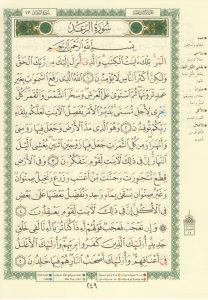Surah Ra’d
Contents
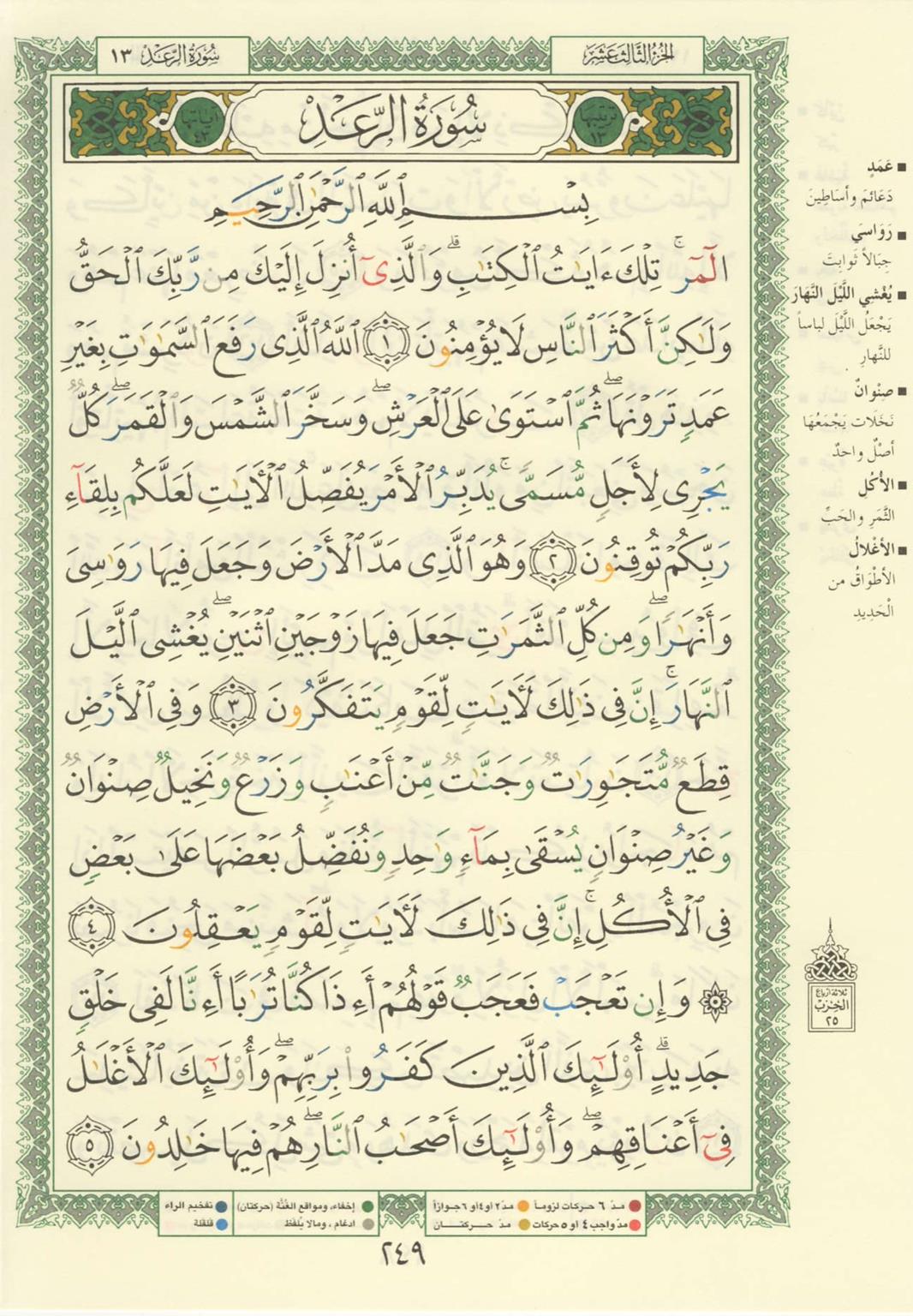
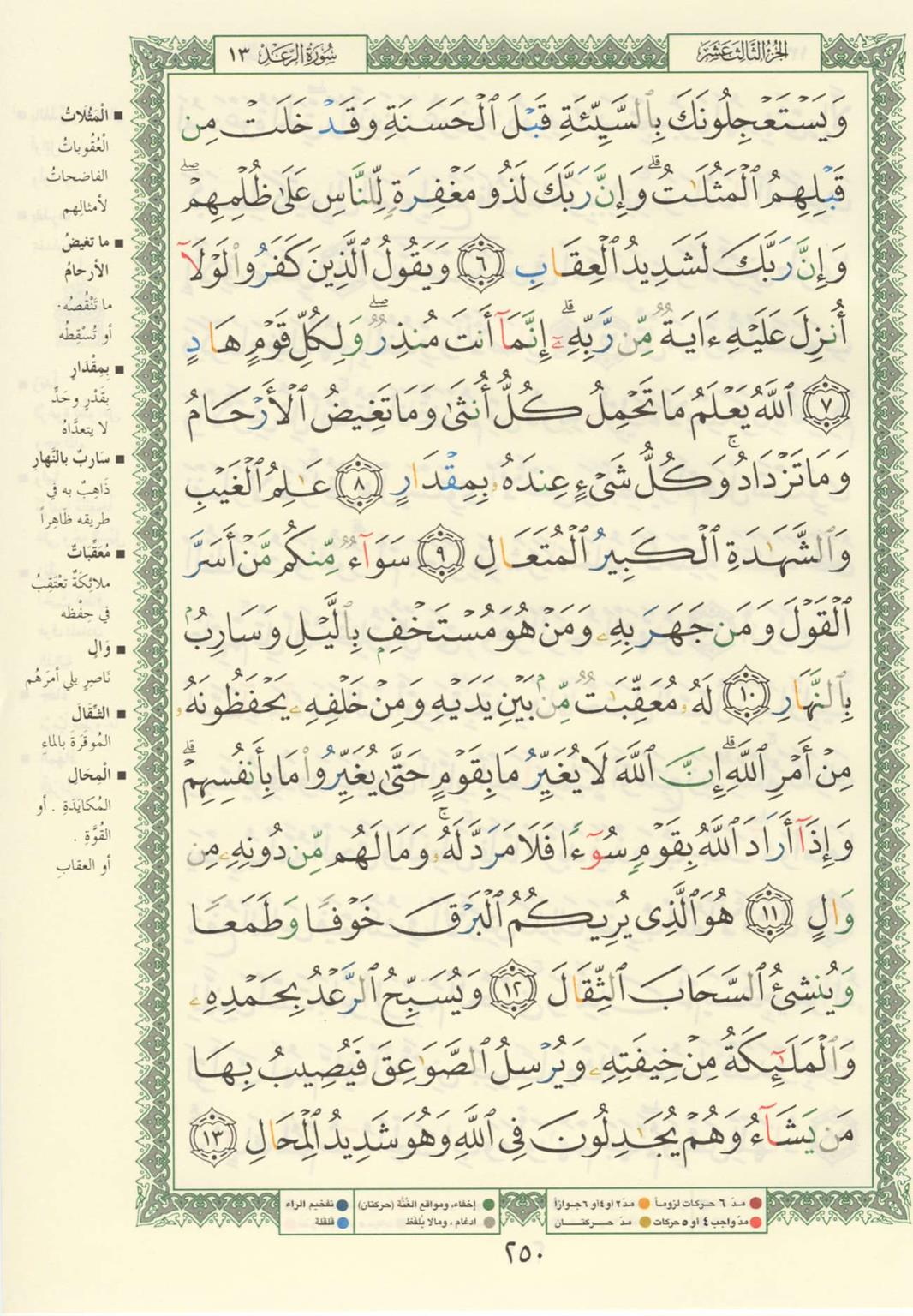
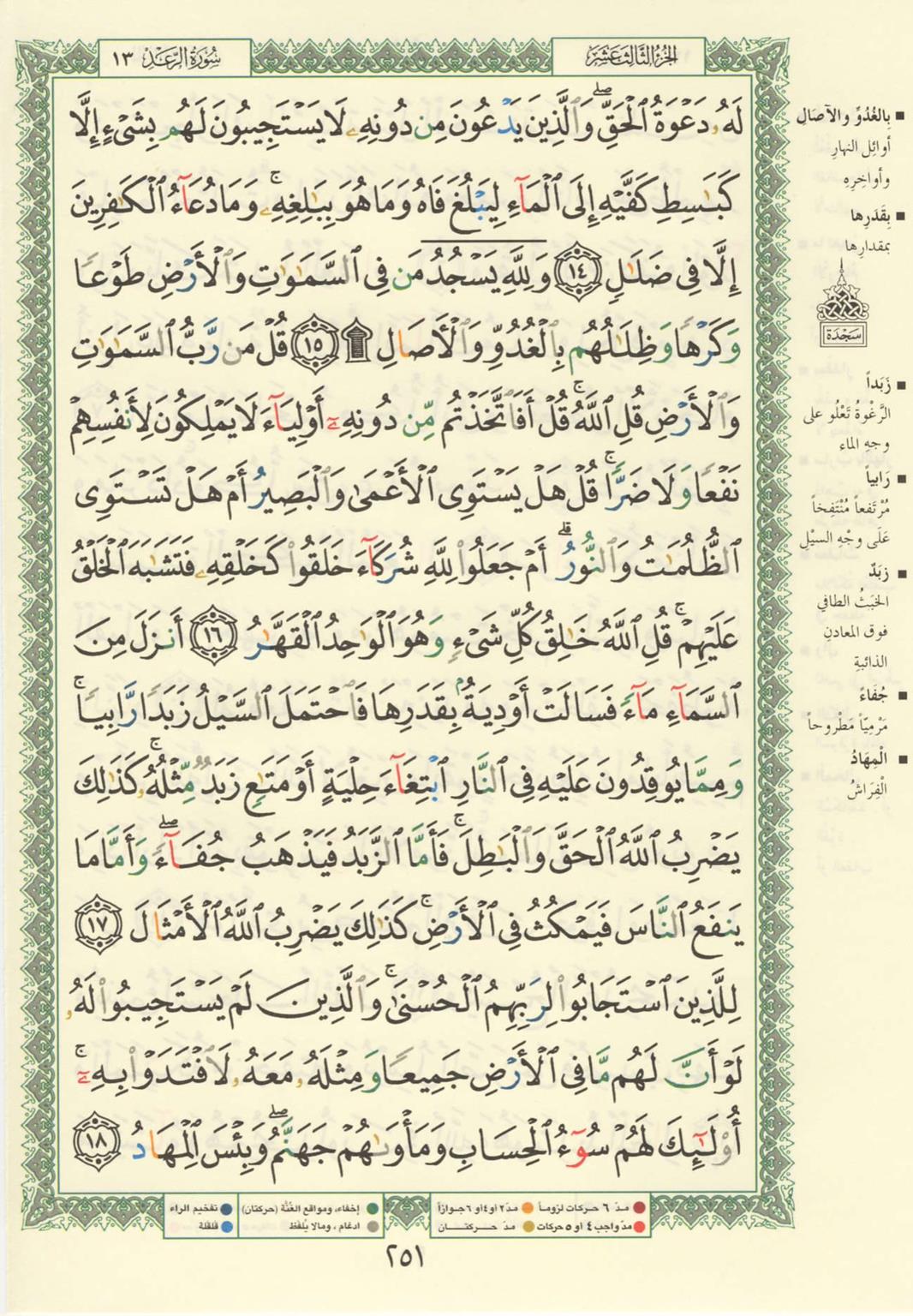
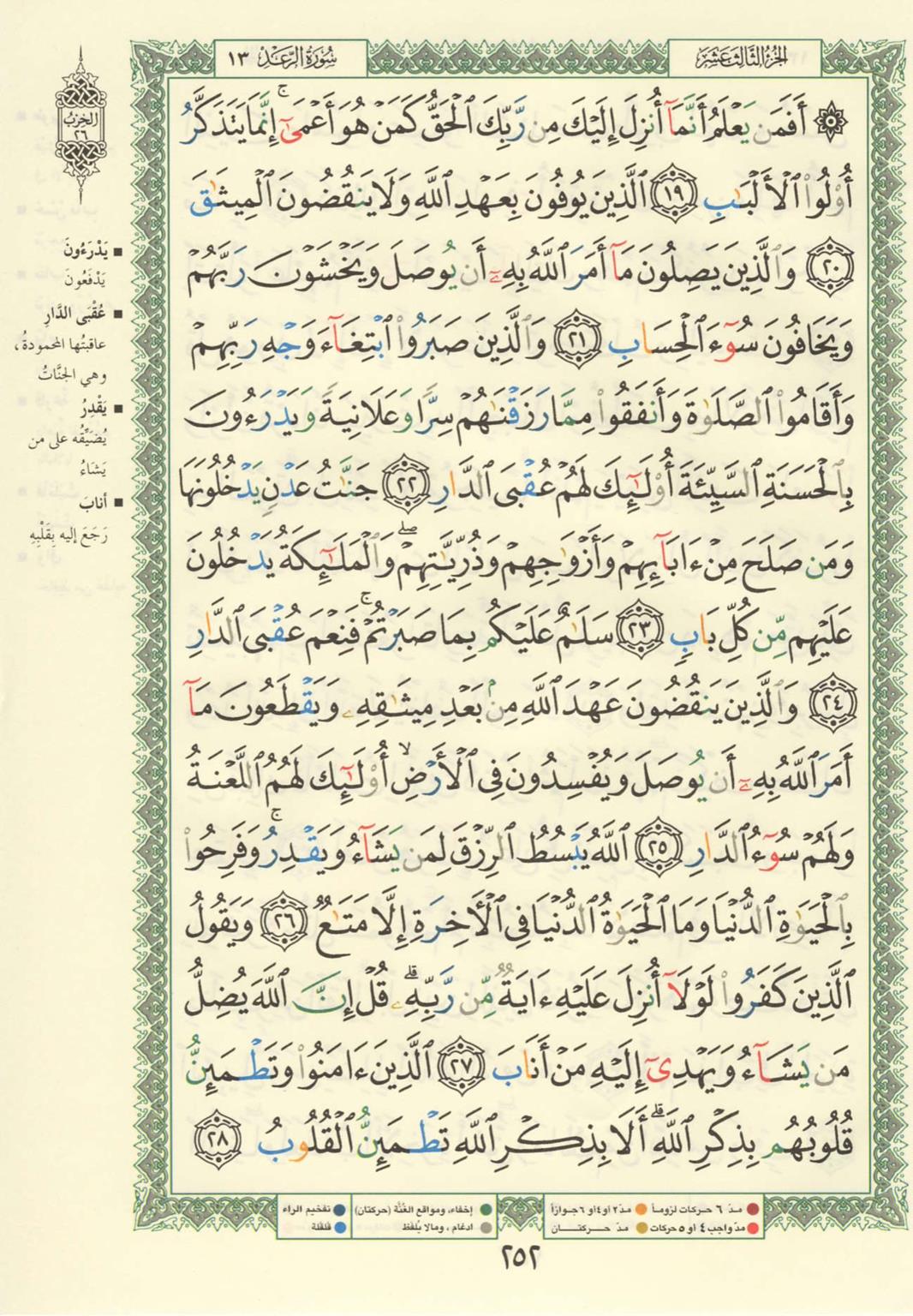
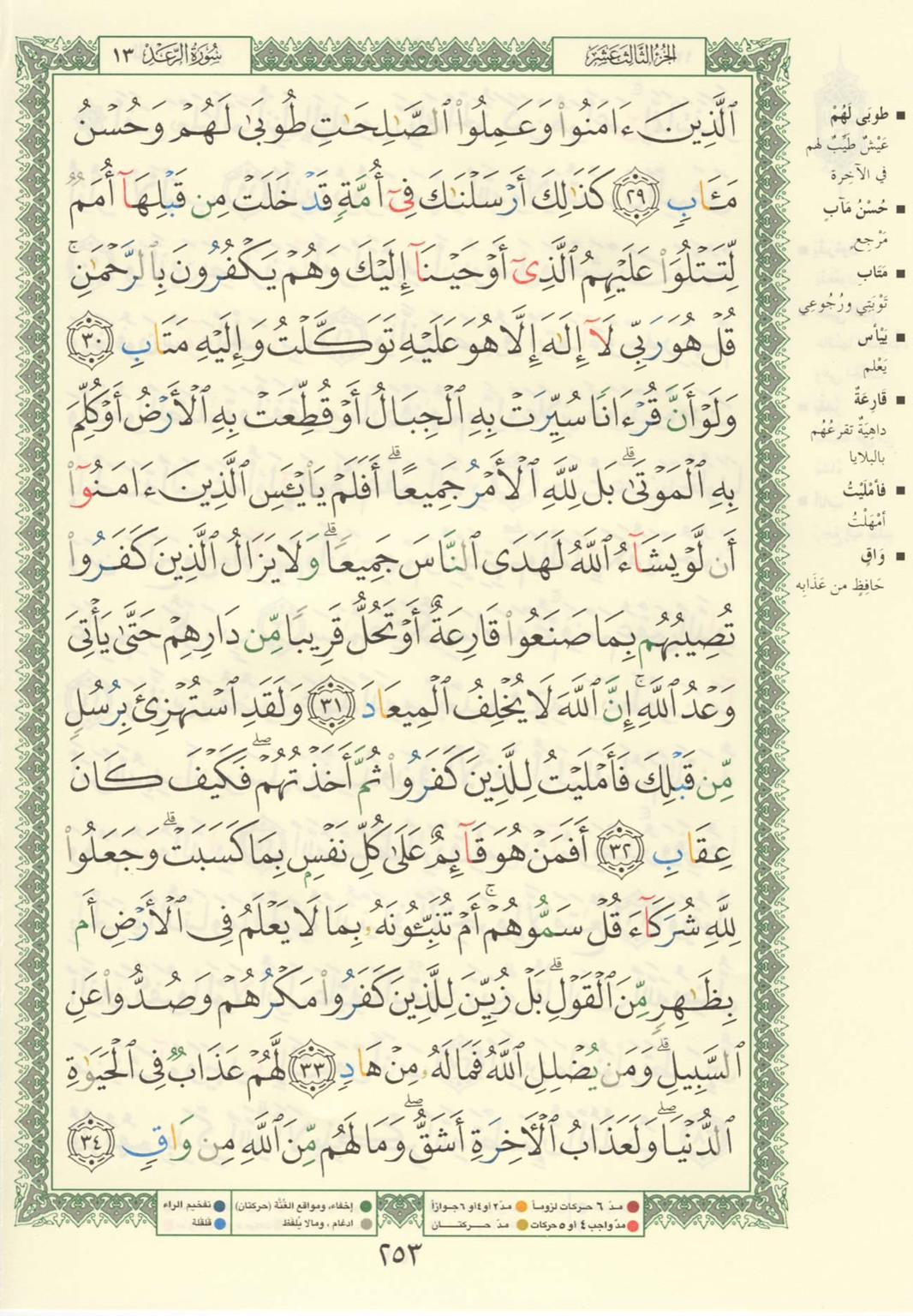
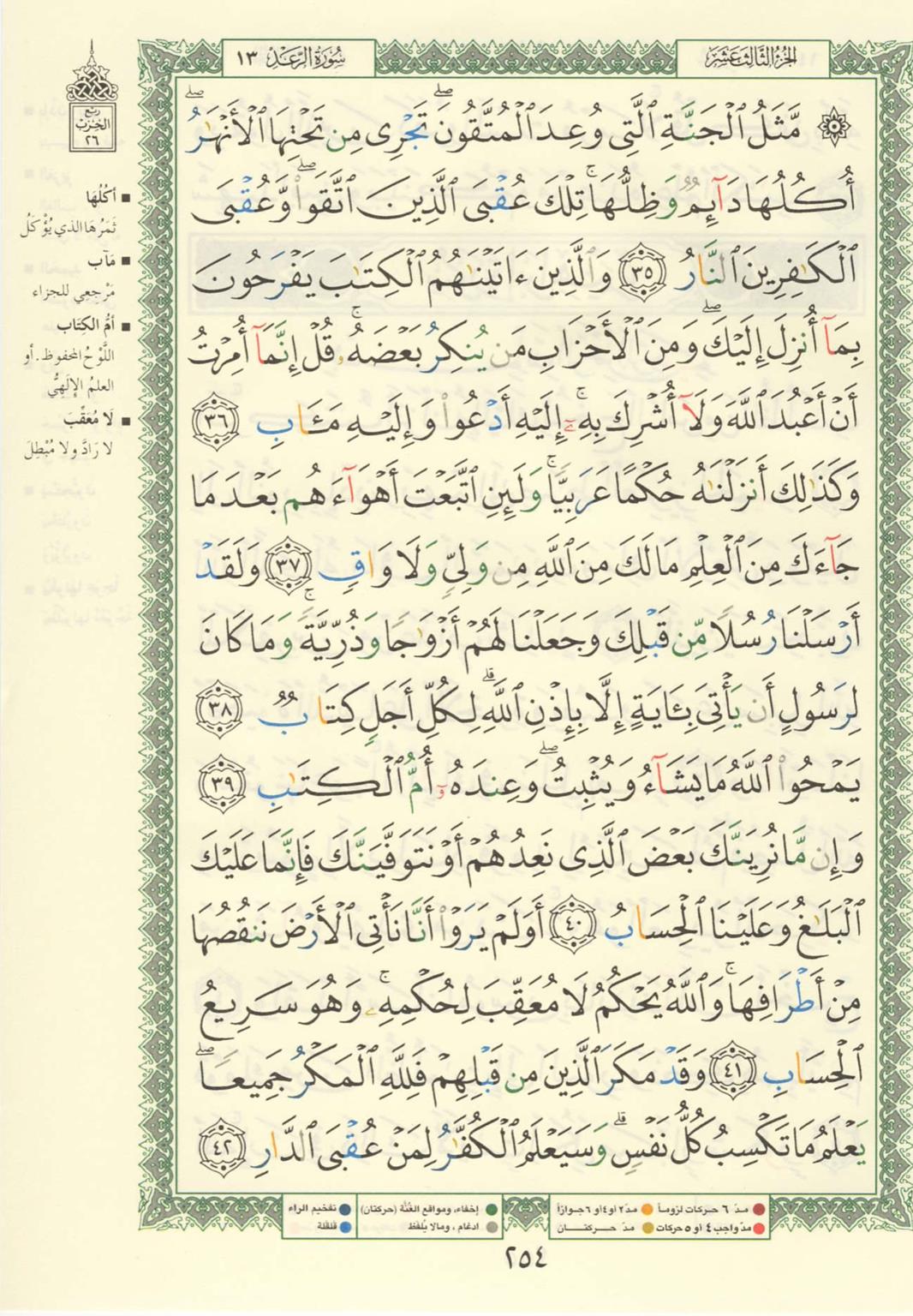

Page 249
13:1
ا-ل-م-ر
![]() الٓمٓرۚ
الٓمّٓرٰ ۫—
alif-lam-meem-ra
Alif Laam Mim Ra.
الٓمٓرۚ
الٓمّٓرٰ ۫—
alif-lam-meem-ra
Alif Laam Mim Ra.
ت-ل-ك
![]() تِلۡكَ
تِلْكَ
til'ka
These
تِلۡكَ
تِلْكَ
til'ka
These
ا-ي-ا
![]() ءَايَٰتُ
اٰیٰتُ
āyātu
(are) the Verses
ءَايَٰتُ
اٰیٰتُ
āyātu
(are) the Verses
ك-ت-ب
![]() ٱلۡكِتَٰبِۗ
الْكِتٰبِ ؕ—
l-kitābi
(of) the Book.
ٱلۡكِتَٰبِۗ
الْكِتٰبِ ؕ—
l-kitābi
(of) the Book.
ا-ل-ل-ذ
![]() وَٱلَّذِيٓ
وَالَّذِیْۤ
wa-alladhī
And that which
وَٱلَّذِيٓ
وَالَّذِیْۤ
wa-alladhī
And that which
ن-ز-ل
![]() أُنزِلَ
اُنْزِلَ
unzila
has been revealed
أُنزِلَ
اُنْزِلَ
unzila
has been revealed
ا-ل-ي
![]() إِلَيۡكَ
اِلَیْكَ
ilayka
to you
إِلَيۡكَ
اِلَیْكَ
ilayka
to you
م-ن
![]() مِن
مِنْ
min
from
مِن
مِنْ
min
from
ر-ب-ب
![]() رَّبِّكَ
رَّبِّكَ
rabbika
your Lord
رَّبِّكَ
رَّبِّكَ
rabbika
your Lord
ح-ق-ق
![]() ٱلۡحَقُّ
الْحَقُّ
l-ḥaqu
(is) the truth,
ٱلۡحَقُّ
الْحَقُّ
l-ḥaqu
(is) the truth,
ل-ك-ن
![]() وَلَٰكِنَّ
وَلٰكِنَّ
walākinna
but
وَلَٰكِنَّ
وَلٰكِنَّ
walākinna
but
ك-ث-ر
![]() أَكۡثَرَ
اَكْثَرَ
akthara
most
أَكۡثَرَ
اَكْثَرَ
akthara
most
ن-و-س
![]() ٱلنَّاسِ
النَّاسِ
n-nāsi
(of) the mankind
ٱلنَّاسِ
النَّاسِ
n-nāsi
(of) the mankind
ل-ا
![]() لَا
لَا
lā
(do) not
لَا
لَا
lā
(do) not
ا-م-ن
![]() يُؤۡمِنُونَ
یُؤْمِنُوْنَ
yu'minūna
believe.
يُؤۡمِنُونَ
یُؤْمِنُوْنَ
yu'minūna
believe.
13:2
ا-ل-ه
![]() ٱللَّهُ
اَللّٰهُ
al-lahu
Allah
ٱللَّهُ
اَللّٰهُ
al-lahu
Allah
ا-ل-ل-ذ
![]() ٱلَّذِي
الَّذِیْ
alladhī
(is) the One Who
ٱلَّذِي
الَّذِیْ
alladhī
(is) the One Who
ر-ف-ع
![]() رَفَعَ
رَفَعَ
rafaʿa
raised
رَفَعَ
رَفَعَ
rafaʿa
raised
س-م-و
![]() ٱلسَّمَٰوَٰتِ
السَّمٰوٰتِ
s-samāwāti
the heavens
ٱلسَّمَٰوَٰتِ
السَّمٰوٰتِ
s-samāwāti
the heavens
غ-ي-ر
![]() بِغَيۡرِ
بِغَیْرِ
bighayri
without
بِغَيۡرِ
بِغَیْرِ
bighayri
without
ع-م-د
![]() عَمَدٖ
عَمَدٍ
ʿamadin
pillars
عَمَدٖ
عَمَدٍ
ʿamadin
pillars
ر-ا-ي
![]() تَرَوۡنَهَاۖ
تَرَوْنَهَا
tarawnahā
that you see,
تَرَوۡنَهَاۖ
تَرَوْنَهَا
tarawnahā
that you see,
ث-م-م
![]() ثُمَّ
ثُمَّ
thumma
then
ثُمَّ
ثُمَّ
thumma
then
س-و-ي
![]() ٱسۡتَوَىٰ
اسْتَوٰی
is'tawā
He established
ٱسۡتَوَىٰ
اسْتَوٰی
is'tawā
He established
ع-ل-ي
![]() عَلَى
عَلَی
ʿalā
on
عَلَى
عَلَی
ʿalā
on
ع-ر-ش
![]() ٱلۡعَرۡشِۖ
الْعَرْشِ
l-ʿarshi
the Throne
ٱلۡعَرۡشِۖ
الْعَرْشِ
l-ʿarshi
the Throne
س-خ-ر
![]() وَسَخَّرَ
وَسَخَّرَ
wasakhara
and subjected
وَسَخَّرَ
وَسَخَّرَ
wasakhara
and subjected
ش-م-س
![]() ٱلشَّمۡسَ
الشَّمْسَ
sh-shamsa
the sun
ٱلشَّمۡسَ
الشَّمْسَ
sh-shamsa
the sun
ق-م-ر
![]() وَٱلۡقَمَرَۖ
وَالْقَمَرَ ؕ—
wal-qamara
and the moon
وَٱلۡقَمَرَۖ
وَالْقَمَرَ ؕ—
wal-qamara
and the moon
ك-ل-ل
![]() كُلّٞ
كُلٌّ
kullun
each
كُلّٞ
كُلٌّ
kullun
each
ج-ر-ي
![]() يَجۡرِي
یَّجْرِیْ
yajrī
running
يَجۡرِي
یَّجْرِیْ
yajrī
running
ا-ج-ل
![]() لِأَجَلٖ
لِاَجَلٍ
li-ajalin
for a term
لِأَجَلٖ
لِاَجَلٍ
li-ajalin
for a term
س-م-و
![]() مُّسَمّٗىۚ
مُّسَمًّی ؕ—
musamman
appointed,
مُّسَمّٗىۚ
مُّسَمًّی ؕ—
musamman
appointed,
د-ب-ر
![]() يُدَبِّرُ
یُدَبِّرُ
yudabbiru
He arranges
يُدَبِّرُ
یُدَبِّرُ
yudabbiru
He arranges
ا-م-ر
![]() ٱلۡأَمۡرَ
الْاَمْرَ
l-amra
the matter;
ٱلۡأَمۡرَ
الْاَمْرَ
l-amra
the matter;
ف-ص-ل
![]() يُفَصِّلُ
یُفَصِّلُ
yufaṣṣilu
He details
يُفَصِّلُ
یُفَصِّلُ
yufaṣṣilu
He details
ا-ي-ا
![]() ٱلۡأٓيَٰتِ
الْاٰیٰتِ
l-āyāti
the Signs
ٱلۡأٓيَٰتِ
الْاٰیٰتِ
l-āyāti
the Signs
ل-ع-ل-ل
![]() لَعَلَّكُم
لَعَلَّكُمْ
laʿallakum
so that you may
لَعَلَّكُم
لَعَلَّكُمْ
laʿallakum
so that you may
ل-ق-ي
![]() بِلِقَآءِ
بِلِقَآءِ
biliqāi
in the meeting
بِلِقَآءِ
بِلِقَآءِ
biliqāi
in the meeting
ر-ب-ب
![]() رَبِّكُمۡ
رَبِّكُمْ
rabbikum
(with) your Lord
رَبِّكُمۡ
رَبِّكُمْ
rabbikum
(with) your Lord
ي-ق-ن
![]() تُوقِنُونَ
تُوْقِنُوْنَ
tūqinūna
believe with certainty.
تُوقِنُونَ
تُوْقِنُوْنَ
tūqinūna
believe with certainty.
13:3
ه-و
![]() وَهُوَ
وَهُوَ
wahuwa
And He
وَهُوَ
وَهُوَ
wahuwa
And He
ا-ل-ل-ذ
![]() ٱلَّذِي
الَّذِیْ
alladhī
(is) the One Who
ٱلَّذِي
الَّذِیْ
alladhī
(is) the One Who
م-د-د
![]() مَدَّ
مَدَّ
madda
spread
مَدَّ
مَدَّ
madda
spread
ا-ر-ض
![]() ٱلۡأَرۡضَ
الْاَرْضَ
l-arḍa
the earth,
ٱلۡأَرۡضَ
الْاَرْضَ
l-arḍa
the earth,
ج-ع-ل
![]() وَجَعَلَ
وَجَعَلَ
wajaʿala
and placed
وَجَعَلَ
وَجَعَلَ
wajaʿala
and placed
ف-ي
![]() فِيهَا
فِیْهَا
fīhā
in it
فِيهَا
فِیْهَا
fīhā
in it
ر-س-و
![]() رَوَٰسِيَ
رَوَاسِیَ
rawāsiya
firm mountains
رَوَٰسِيَ
رَوَاسِیَ
rawāsiya
firm mountains
ن-ه-ر
![]() وَأَنۡهَٰرٗاۖ
وَاَنْهٰرًا ؕ—
wa-anhāran
and rivers,
وَأَنۡهَٰرٗاۖ
وَاَنْهٰرًا ؕ—
wa-anhāran
and rivers,
م-ن
![]() وَمِن
وَمِنْ
wamin
and from
وَمِن
وَمِنْ
wamin
and from
ك-ل-ل
![]() كُلِّ
كُلِّ
kulli
all
كُلِّ
كُلِّ
kulli
all
ث-م-ر
![]() ٱلثَّمَرَٰتِ
الثَّمَرٰتِ
l-thamarāti
(of) the fruits
ٱلثَّمَرَٰتِ
الثَّمَرٰتِ
l-thamarāti
(of) the fruits
ج-ع-ل
![]() جَعَلَ
جَعَلَ
jaʿala
He made
جَعَلَ
جَعَلَ
jaʿala
He made
ف-ي
![]() فِيهَا
فِیْهَا
fīhā
in it
فِيهَا
فِیْهَا
fīhā
in it
ز-و-ج
![]() زَوۡجَيۡنِ
زَوْجَیْنِ
zawjayni
pairs
زَوۡجَيۡنِ
زَوْجَیْنِ
zawjayni
pairs
ث-ن-ي
![]() ٱثۡنَيۡنِۖ
اثْنَیْنِ
ith'nayni
two.
ٱثۡنَيۡنِۖ
اثْنَیْنِ
ith'nayni
two.
غ-ش-ي
![]() يُغۡشِي
یُغْشِی
yugh'shī
He covers
يُغۡشِي
یُغْشِی
yugh'shī
He covers
ل-ي-ل
![]() ٱلَّيۡلَ
الَّیْلَ
al-layla
the night
ٱلَّيۡلَ
الَّیْلَ
al-layla
the night
ن-ه-ر
![]() ٱلنَّهَارَۚ
النَّهَارَ ؕ—
n-nahāra
(with) the day.
ٱلنَّهَارَۚ
النَّهَارَ ؕ—
n-nahāra
(with) the day.
ا-ن-ن
![]() إِنَّ
اِنَّ
inna
Indeed,
إِنَّ
اِنَّ
inna
Indeed,
ف-ي
![]() فِي
فِیْ
fī
in
فِي
فِیْ
fī
in
ذ-ل-ك
![]() ذَٰلِكَ
ذٰلِكَ
dhālika
that
ذَٰلِكَ
ذٰلِكَ
dhālika
that
ا-ي-ا
![]() لَأٓيَٰتٖ
لَاٰیٰتٍ
laāyātin
surely (are) Signs
لَأٓيَٰتٖ
لَاٰیٰتٍ
laāyātin
surely (are) Signs
ق-و-م
![]() لِّقَوۡمٖ
لِّقَوْمٍ
liqawmin
for a people
لِّقَوۡمٖ
لِّقَوْمٍ
liqawmin
for a people
ف-ك-ر
![]() يَتَفَكَّرُونَ
یَّتَفَكَّرُوْنَ
yatafakkarūna
who ponder.
يَتَفَكَّرُونَ
یَّتَفَكَّرُوْنَ
yatafakkarūna
who ponder.
13:4
ف-ي
![]() وَفِي
وَفِی
wafī
And in
وَفِي
وَفِی
wafī
And in
ا-ر-ض
![]() ٱلۡأَرۡضِ
الْاَرْضِ
l-arḍi
the earth
ٱلۡأَرۡضِ
الْاَرْضِ
l-arḍi
the earth
ق-ط-ع
![]() قِطَعٞ
قِطَعٌ
qiṭaʿun
are tracks
قِطَعٞ
قِطَعٌ
qiṭaʿun
are tracks
ج-و-ر
![]() مُّتَجَٰوِرَٰتٞ
مُّتَجٰوِرٰتٌ
mutajāwirātun
neighboring,
مُّتَجَٰوِرَٰتٞ
مُّتَجٰوِرٰتٌ
mutajāwirātun
neighboring,
ج-ن-ن
![]() وَجَنَّٰتٞ
وَّجَنّٰتٌ
wajannātun
and gardens
وَجَنَّٰتٞ
وَّجَنّٰتٌ
wajannātun
and gardens
م-ن
![]() مِّنۡ
مِّنْ
min
of
مِّنۡ
مِّنْ
min
of
ع-ن-ب
![]() أَعۡنَٰبٖ
اَعْنَابٍ
aʿnābin
grapevines
أَعۡنَٰبٖ
اَعْنَابٍ
aʿnābin
grapevines
ز-ر-ع
![]() وَزَرۡعٞ
وَّزَرْعٌ
wazarʿun
and crops
وَزَرۡعٞ
وَّزَرْعٌ
wazarʿun
and crops
ن-خ-ل
![]() وَنَخِيلٞ
وَّنَخِیْلٌ
wanakhīlun
and date-palms
وَنَخِيلٞ
وَّنَخِیْلٌ
wanakhīlun
and date-palms
ص-ن-و
![]() صِنۡوَانٞ
صِنْوَانٌ
ṣin'wānun
trees (growing) from a single root
صِنۡوَانٞ
صِنْوَانٌ
ṣin'wānun
trees (growing) from a single root
غ-ي-ر
![]() وَغَيۡرُ
وَّغَیْرُ
waghayru
and trees not (growing) from a single root.
وَغَيۡرُ
وَّغَیْرُ
waghayru
and trees not (growing) from a single root.
ص-ن-و
![]() صِنۡوَانٖ
صِنْوَانٍ
ṣin'wānin
and trees not (growing) from a single root.
صِنۡوَانٖ
صِنْوَانٍ
ṣin'wānin
and trees not (growing) from a single root.
س-ق-ي
![]() يُسۡقَىٰ
یُّسْقٰی
yus'qā
watered
يُسۡقَىٰ
یُّسْقٰی
yus'qā
watered
م-و-ه
![]() بِمَآءٖ
بِمَآءٍ
bimāin
with one water;
بِمَآءٖ
بِمَآءٍ
bimāin
with one water;
و-ح-د
![]() وَٰحِدٖ
وَّاحِدٍ ۫—
wāḥidin
with one water;
وَٰحِدٖ
وَّاحِدٍ ۫—
wāḥidin
with one water;
ف-ض-ل
![]() وَنُفَضِّلُ
وَنُفَضِّلُ
wanufaḍḍilu
but We cause to exceed
وَنُفَضِّلُ
وَنُفَضِّلُ
wanufaḍḍilu
but We cause to exceed
ب-ع-ض
![]() بَعۡضَهَا
بَعْضَهَا
baʿḍahā
some of them
بَعۡضَهَا
بَعْضَهَا
baʿḍahā
some of them
ع-ل-ي
![]() عَلَىٰ
عَلٰی
ʿalā
over
عَلَىٰ
عَلٰی
ʿalā
over
ب-ع-ض
![]() بَعۡضٖ
بَعْضٍ
baʿḍin
others
بَعۡضٖ
بَعْضٍ
baʿḍin
others
ف-ي
![]() فِي
فِی
fī
in
فِي
فِی
fī
in
ا-ك-ل
![]() ٱلۡأُكُلِۚ
الْاُكُلِ ؕ—
l-ukuli
the fruit.
ٱلۡأُكُلِۚ
الْاُكُلِ ؕ—
l-ukuli
the fruit.
ا-ن-ن
![]() إِنَّ
اِنَّ
inna
Indeed,
إِنَّ
اِنَّ
inna
Indeed,
ف-ي
![]() فِي
فِیْ
fī
in
فِي
فِیْ
fī
in
ذ-ل-ك
![]() ذَٰلِكَ
ذٰلِكَ
dhālika
that
ذَٰلِكَ
ذٰلِكَ
dhālika
that
ا-ي-ا
![]() لَأٓيَٰتٖ
لَاٰیٰتٍ
laāyātin
surely (are) Signs
لَأٓيَٰتٖ
لَاٰیٰتٍ
laāyātin
surely (are) Signs
ق-و-م
![]() لِّقَوۡمٖ
لِّقَوْمٍ
liqawmin
for a people
لِّقَوۡمٖ
لِّقَوْمٍ
liqawmin
for a people
ع-ق-ل
![]() يَعۡقِلُونَ
یَّعْقِلُوْنَ
yaʿqilūna
who use reason.
يَعۡقِلُونَ
یَّعْقِلُوْنَ
yaʿqilūna
who use reason.
13:5
ا-ن
![]() ۞وَإِن
وَاِنْ
wa-in
And if
۞وَإِن
وَاِنْ
wa-in
And if
ع-ج-ب
![]() تَعۡجَبۡ
تَعْجَبْ
taʿjab
you (are) astonished,
تَعۡجَبۡ
تَعْجَبْ
taʿjab
you (are) astonished,
ع-ج-ب
![]() فَعَجَبٞ
فَعَجَبٌ
faʿajabun
then astonishing
فَعَجَبٞ
فَعَجَبٌ
faʿajabun
then astonishing
ق-و-ل
![]() قَوۡلُهُمۡ
قَوْلُهُمْ
qawluhum
(is) their saying,
قَوۡلُهُمۡ
قَوْلُهُمْ
qawluhum
(is) their saying,
ا-ذ-ا
![]() أَءِذَا
ءَاِذَا
a-idhā
"When
أَءِذَا
ءَاِذَا
a-idhā
"When
ك-و-ن
![]() كُنَّا
كُنَّا
kunnā
we are
كُنَّا
كُنَّا
kunnā
we are
ت-ر-ب
![]() تُرَٰبًا
تُرٰبًا
turāban
dust,
تُرَٰبًا
تُرٰبًا
turāban
dust,
ا-ن-ن
![]() أَءِنَّا
ءَاِنَّا
a-innā
will we
أَءِنَّا
ءَاِنَّا
a-innā
will we
ف-ي
![]() لَفِي
لَفِیْ
lafī
(be) indeed, in
لَفِي
لَفِیْ
lafī
(be) indeed, in
خ-ل-ق
![]() خَلۡقٖ
خَلْقٍ
khalqin
a creation
خَلۡقٖ
خَلْقٍ
khalqin
a creation
ج-د-د
![]() جَدِيدٍۗ
جَدِیْدٍ ؕ۬—
jadīdin
new?"
جَدِيدٍۗ
جَدِیْدٍ ؕ۬—
jadīdin
new?"
ا-و-ل-ا
![]() أُوْلَٰٓئِكَ
اُولٰٓىِٕكَ
ulāika
Those
أُوْلَٰٓئِكَ
اُولٰٓىِٕكَ
ulāika
Those
ا-ل-ل-ذ
![]() ٱلَّذِينَ
الَّذِیْنَ
alladhīna
(are) the ones who
ٱلَّذِينَ
الَّذِیْنَ
alladhīna
(are) the ones who
ك-ف-ر
![]() كَفَرُواْ
كَفَرُوْا
kafarū
disbelieved
كَفَرُواْ
كَفَرُوْا
kafarū
disbelieved
ر-ب-ب
![]() بِرَبِّهِمۡۖ
بِرَبِّهِمْ ۚ—
birabbihim
in their Lord,
بِرَبِّهِمۡۖ
بِرَبِّهِمْ ۚ—
birabbihim
in their Lord,
ا-و-ل-ا
![]() وَأُوْلَٰٓئِكَ
وَاُولٰٓىِٕكَ
wa-ulāika
and those
وَأُوْلَٰٓئِكَ
وَاُولٰٓىِٕكَ
wa-ulāika
and those
غ-ل-ل
![]() ٱلۡأَغۡلَٰلُ
الْاَغْلٰلُ
l-aghlālu
the iron chains
ٱلۡأَغۡلَٰلُ
الْاَغْلٰلُ
l-aghlālu
the iron chains
ف-ي
![]() فِيٓ
فِیْۤ
fī
(will be) in
فِيٓ
فِیْۤ
fī
(will be) in
ع-ن-ق
![]() أَعۡنَاقِهِمۡۖ
اَعْنَاقِهِمْ ۚ—
aʿnāqihim
their necks,
أَعۡنَاقِهِمۡۖ
اَعْنَاقِهِمْ ۚ—
aʿnāqihim
their necks,
ا-و-ل-ا
![]() وَأُوْلَٰٓئِكَ
وَاُولٰٓىِٕكَ
wa-ulāika
those
وَأُوْلَٰٓئِكَ
وَاُولٰٓىِٕكَ
wa-ulāika
those
ص-ح-ب
![]() أَصۡحَٰبُ
اَصْحٰبُ
aṣḥābu
(are the) companions
أَصۡحَٰبُ
اَصْحٰبُ
aṣḥābu
(are the) companions
ن-و-ر
![]() ٱلنَّارِۖ
النَّارِ ۚ—
n-nāri
(of) the Fire,
ٱلنَّارِۖ
النَّارِ ۚ—
n-nāri
(of) the Fire,
ه-م
![]() هُمۡ
هُمْ
hum
they
هُمۡ
هُمْ
hum
they
ف-ي
![]() فِيهَا
فِیْهَا
fīhā
in it
فِيهَا
فِیْهَا
fīhā
in it
خ-ل-د
![]() خَٰلِدُونَ
خٰلِدُوْنَ
khālidūna
(will) abide forever.
خَٰلِدُونَ
خٰلِدُوْنَ
khālidūna
(will) abide forever.
13:6
ع-ج-ل
![]() وَيَسۡتَعۡجِلُونَكَ
وَیَسْتَعْجِلُوْنَكَ
wayastaʿjilūnaka
And they ask you to hasten
وَيَسۡتَعۡجِلُونَكَ
وَیَسْتَعْجِلُوْنَكَ
wayastaʿjilūnaka
And they ask you to hasten
س-و-ا
![]() بِٱلسَّيِّئَةِ
بِالسَّیِّئَةِ
bis-sayi-ati
the evil
بِٱلسَّيِّئَةِ
بِالسَّیِّئَةِ
bis-sayi-ati
the evil
ق-ب-ل
![]() قَبۡلَ
قَبْلَ
qabla
before
قَبۡلَ
قَبْلَ
qabla
before
ح-س-ن
![]() ٱلۡحَسَنَةِ
الْحَسَنَةِ
l-ḥasanati
the good
ٱلۡحَسَنَةِ
الْحَسَنَةِ
l-ḥasanati
the good
ق-د
![]() وَقَدۡ
وَقَدْ
waqad
and verily
وَقَدۡ
وَقَدْ
waqad
and verily
خ-ل-و
![]() خَلَتۡ
خَلَتْ
khalat
has occurred
خَلَتۡ
خَلَتْ
khalat
has occurred
م-ن
![]() مِن
مِنْ
min
before them
مِن
مِنْ
min
before them
ق-ب-ل
![]() قَبۡلِهِمُ
قَبْلِهِمُ
qablihimu
before them
قَبۡلِهِمُ
قَبْلِهِمُ
qablihimu
before them
م-ث-ل
![]() ٱلۡمَثُلَٰتُۗ
الْمَثُلٰتُ ؕ—
l-mathulātu
[the] similar punishments.
ٱلۡمَثُلَٰتُۗ
الْمَثُلٰتُ ؕ—
l-mathulātu
[the] similar punishments.
ا-ن-ن
![]() وَإِنَّ
وَاِنَّ
wa-inna
And indeed,
وَإِنَّ
وَاِنَّ
wa-inna
And indeed,
ر-ب-ب
![]() رَبَّكَ
رَبَّكَ
rabbaka
your Lord
رَبَّكَ
رَبَّكَ
rabbaka
your Lord
ذ-و
![]() لَذُو
لَذُوْ
ladhū
(is) Full of Forgiveness
لَذُو
لَذُوْ
ladhū
(is) Full of Forgiveness
غ-ف-ر
![]() مَغۡفِرَةٖ
مَغْفِرَةٍ
maghfiratin
(is) Full of Forgiveness
مَغۡفِرَةٖ
مَغْفِرَةٍ
maghfiratin
(is) Full of Forgiveness
ن-و-س
![]() لِّلنَّاسِ
لِّلنَّاسِ
lilnnāsi
for mankind
لِّلنَّاسِ
لِّلنَّاسِ
lilnnāsi
for mankind
ع-ل-ي
![]() عَلَىٰ
عَلٰی
ʿalā
for
عَلَىٰ
عَلٰی
ʿalā
for
ظ-ل-م
![]() ظُلۡمِهِمۡۖ
ظُلْمِهِمْ ۚ—
ẓul'mihim
their wrongdoing,
ظُلۡمِهِمۡۖ
ظُلْمِهِمْ ۚ—
ẓul'mihim
their wrongdoing,
ا-ن-ن
![]() وَإِنَّ
وَاِنَّ
wa-inna
and indeed,
وَإِنَّ
وَاِنَّ
wa-inna
and indeed,
ر-ب-ب
![]() رَبَّكَ
رَبَّكَ
rabbaka
your Lord
رَبَّكَ
رَبَّكَ
rabbaka
your Lord
ش-د-د
![]() لَشَدِيدُ
لَشَدِیْدُ
lashadīdu
(is) severe
لَشَدِيدُ
لَشَدِیْدُ
lashadīdu
(is) severe
ع-ق-ب
![]() ٱلۡعِقَابِ
الْعِقَابِ
l-ʿiqābi
(in) the penalty.
ٱلۡعِقَابِ
الْعِقَابِ
l-ʿiqābi
(in) the penalty.
13:7
ق-و-ل
![]() وَيَقُولُ
وَیَقُوْلُ
wayaqūlu
And say
وَيَقُولُ
وَیَقُوْلُ
wayaqūlu
And say
ا-ل-ل-ذ
![]() ٱلَّذِينَ
الَّذِیْنَ
alladhīna
those who
ٱلَّذِينَ
الَّذِیْنَ
alladhīna
those who
ك-ف-ر
![]() كَفَرُواْ
كَفَرُوْا
kafarū
disbelieved,
كَفَرُواْ
كَفَرُوْا
kafarū
disbelieved,
ل-و-ل-ا
![]() لَوۡلَآ
لَوْلَاۤ
lawlā
"Why not
لَوۡلَآ
لَوْلَاۤ
lawlā
"Why not
ن-ز-ل
![]() أُنزِلَ
اُنْزِلَ
unzila
has been sent down
أُنزِلَ
اُنْزِلَ
unzila
has been sent down
ع-ل-ي
![]() عَلَيۡهِ
عَلَیْهِ
ʿalayhi
to him
عَلَيۡهِ
عَلَیْهِ
ʿalayhi
to him
ا-ي-ا
![]() ءَايَةٞ
اٰیَةٌ
āyatun
a sign
ءَايَةٞ
اٰیَةٌ
āyatun
a sign
م-ن
![]() مِّن
مِّنْ
min
from
مِّن
مِّنْ
min
from
ر-ب-ب
![]() رَّبِّهِۦٓۗ
رَّبِّهٖ ؕ—
rabbihi
his Lord?"
رَّبِّهِۦٓۗ
رَّبِّهٖ ؕ—
rabbihi
his Lord?"
ا-ن-ن-م
![]() إِنَّمَآ
اِنَّمَاۤ
innamā
Only
إِنَّمَآ
اِنَّمَاۤ
innamā
Only
ا-ن-ت
![]() أَنتَ
اَنْتَ
anta
you
أَنتَ
اَنْتَ
anta
you
ن-ذ-ر
![]() مُنذِرٞۖ
مُنْذِرٌ
mundhirun
(are) a warner,
مُنذِرٞۖ
مُنْذِرٌ
mundhirun
(are) a warner,
ك-ل-ل
![]() وَلِكُلِّ
وَّلِكُلِّ
walikulli
and for every
وَلِكُلِّ
وَّلِكُلِّ
walikulli
and for every
ق-و-م
![]() قَوۡمٍ
قَوْمٍ
qawmin
people
قَوۡمٍ
قَوْمٍ
qawmin
people
ه-د-ي
![]() هَادٍ
هَادٍ
hādin
(is) a guide.
هَادٍ
هَادٍ
hādin
(is) a guide.
13:8
ا-ل-ه
![]() ٱللَّهُ
اَللّٰهُ
al-lahu
Allah
ٱللَّهُ
اَللّٰهُ
al-lahu
Allah
ع-ل-م
![]() يَعۡلَمُ
یَعْلَمُ
yaʿlamu
knows
يَعۡلَمُ
یَعْلَمُ
yaʿlamu
knows
م-ا
![]() مَا
مَا
mā
what
مَا
مَا
mā
what
ح-م-ل
![]() تَحۡمِلُ
تَحْمِلُ
taḥmilu
carries
تَحۡمِلُ
تَحْمِلُ
taḥmilu
carries
ك-ل-ل
![]() كُلُّ
كُلُّ
kullu
every
كُلُّ
كُلُّ
kullu
every
ا-ن-ث
![]() أُنثَىٰ
اُ
unthā
female,
أُنثَىٰ
اُ
unthā
female,
م-ا
![]() وَمَا
وَمَا
wamā
and what
وَمَا
وَمَا
wamā
and what
غ-ي-ض
![]() تَغِيضُ
تَغِیْضُ
taghīḍu
fall short
تَغِيضُ
تَغِیْضُ
taghīḍu
fall short
ر-ح-م
![]() ٱلۡأَرۡحَامُ
الْاَرْحَامُ
l-arḥāmu
the womb,
ٱلۡأَرۡحَامُ
الْاَرْحَامُ
l-arḥāmu
the womb,
م-ا
![]() وَمَا
وَمَا
wamā
and what
وَمَا
وَمَا
wamā
and what
ز-ي-د
![]() تَزۡدَادُۚ
تَزْدَادُ ؕ—
tazdādu
they exceed.
تَزۡدَادُۚ
تَزْدَادُ ؕ—
tazdādu
they exceed.
ك-ل-ل
![]() وَكُلُّ
وَكُلُّ
wakullu
And every
وَكُلُّ
وَكُلُّ
wakullu
And every
ش-ي-ا
![]() شَيۡءٍ
شَیْءٍ
shayin
thing
شَيۡءٍ
شَیْءٍ
shayin
thing
ع-ن-د
![]() عِندَهُۥ
عِنْدَهٗ
ʿindahu
with Him
عِندَهُۥ
عِنْدَهٗ
ʿindahu
with Him
ق-د-ر
![]() بِمِقۡدَارٍ
بِمِقْدَارٍ
bimiq'dārin
(is) in due proportion.
بِمِقۡدَارٍ
بِمِقْدَارٍ
bimiq'dārin
(is) in due proportion.
13:9
ع-ل-م
![]() عَٰلِمُ
عٰلِمُ
ʿālimu
Knower
عَٰلِمُ
عٰلِمُ
ʿālimu
Knower
غ-ي-ب
![]() ٱلۡغَيۡبِ
الْغَیْبِ
l-ghaybi
(of) the unseen
ٱلۡغَيۡبِ
الْغَیْبِ
l-ghaybi
(of) the unseen
ش-ه-د
![]() وَٱلشَّهَٰدَةِ
وَالشَّهَادَةِ
wash-shahādati
and the witnessed,
وَٱلشَّهَٰدَةِ
وَالشَّهَادَةِ
wash-shahādati
and the witnessed,
ك-ب-ر
![]() ٱلۡكَبِيرُ
الْكَبِیْرُ
l-kabīru
the Most Great,
ٱلۡكَبِيرُ
الْكَبِیْرُ
l-kabīru
the Most Great,
ع-ل-و
![]() ٱلۡمُتَعَالِ
الْمُتَعَالِ
l-mutaʿāli
the Most High.
ٱلۡمُتَعَالِ
الْمُتَعَالِ
l-mutaʿāli
the Most High.
13:10
س-و-ي
![]() سَوَآءٞ
سَوَآءٌ
sawāon
(It is) same (to Him)
سَوَآءٞ
سَوَآءٌ
sawāon
(It is) same (to Him)
م-ن
![]() مِّنكُم
مِّنْكُمْ
minkum
[of you]
مِّنكُم
مِّنْكُمْ
minkum
[of you]
م-ن
![]() مَّنۡ
مَّنْ
man
(one) who
مَّنۡ
مَّنْ
man
(one) who
س-ر-ر
![]() أَسَرَّ
اَسَرَّ
asarra
conceals
أَسَرَّ
اَسَرَّ
asarra
conceals
ق-و-ل
![]() ٱلۡقَوۡلَ
الْقَوْلَ
l-qawla
the speech
ٱلۡقَوۡلَ
الْقَوْلَ
l-qawla
the speech
م-ن
![]() وَمَن
وَمَنْ
waman
or (one) who
وَمَن
وَمَنْ
waman
or (one) who
ج-ه-ر
![]() جَهَرَ
جَهَرَ
jahara
publicizes it
جَهَرَ
جَهَرَ
jahara
publicizes it
ب
![]() بِهِۦ
بِهٖ
bihi
publicizes it
بِهِۦ
بِهٖ
bihi
publicizes it
م-ن
![]() وَمَنۡ
وَمَنْ
waman
and (one) who
وَمَنۡ
وَمَنْ
waman
and (one) who
ه-و
![]() هُوَ
هُوَ
huwa
[he]
هُوَ
هُوَ
huwa
[he]
خ-ف-ي
![]() مُسۡتَخۡفِۭ
مُسْتَخْفٍ
mus'takhfin
(is) hidden
مُسۡتَخۡفِۭ
مُسْتَخْفٍ
mus'takhfin
(is) hidden
ل-ي-ل
![]() بِٱلَّيۡلِ
بِالَّیْلِ
bi-al-layli
by night
بِٱلَّيۡلِ
بِالَّیْلِ
bi-al-layli
by night
س-ر-ب
![]() وَسَارِبُۢ
وَسَارِبٌ
wasāribun
or goes freely
وَسَارِبُۢ
وَسَارِبٌ
wasāribun
or goes freely
ن-ه-ر
![]() بِٱلنَّهَارِ
بِالنَّهَارِ
bin-nahāri
by day.
بِٱلنَّهَارِ
بِالنَّهَارِ
bin-nahāri
by day.

